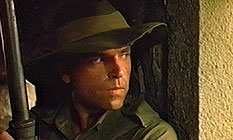|
|
|
|
Attack
Force Z
|
 |
|
Attack Force Z has lived its life mainly on video, where it acquired a market value due to those cast members who subsequently ascended to stardom – Mel Gibson, Sam Neill, John Waters and (to a lesser extent) Haywood. Perhaps equally prescient, in a less spectacular way, was the attempt of the film to plug into an "Australasian" production base, something which John McCallum and Lee Robinson (a film director from the '50s) had already explored in their TV series Bailey's Bird (1976-7), and were to do so again in another Force Z story, The Highest Honor (1983). The film itself, set in World War II, mixes progressive and reactionary elements in a curious and contradictory way. From one angle, it is an entirely conventional, even backward-looking generic war drama – authorised and authenticated (as a pre-credit title card informs us) by the veterans of the Z Force Association. Beginning in medias res like Samuel Fuller's The Big Red One (1980), the Force land on an island held by the Japanese. Gradually their mission is revealed to us: to safely transport two diplomats who are being hidden and protected by the local "resistance". The film makes a laborious and somewhat suspect distinction between the nasty Japanese – cold-blooded, snivelling, robotic – and those stoic, dignified, mystical islanders who follow Chinese traditions. Thus, the film has a high dose of traditional gung ho war film heroics. Yet, at the same time, it is also a film in the Gallipoli tradition about Aussie losers – only Gibson gets out alive, and even the diplomat he presumes to have rescued turns out to be dead – and about a rapprochement and co-operation between Western and Oriental societies that is tragically cut short by the relentless atrocities of war. This latter theme is specifically dramatised through the love story of John Phillip Law and Sylvia Chang, and finds its most affecting expression in the final shot where a lifting camera surveys, with Chang, the carnage and waste precipitated by the Force's operation. Tim Burstall took over as director from Philip Noyce shortly before shooting started. According to David Stratton's account in The Avocado Plantation, the film was originally intended to "explore aspects of colonialism", the outline of which one can dimly imagine from the film as it is. Burstall's direction is crisp in an unfussy action-movie fashion, with character relations and dramatic tensions sketched economically and confidently; his unmistakeably "old fashioned" approach, however, is underlined by Eric Jupp's appallingly clichéd score (oriental chimes and gongs for the islanders, military brass and drums for the soldiers). Overall, Attack Force Z is an interesting and somewhat overlooked film. MORE Burstall: Duet for Four, The Naked Country © Adrian Martin 1991 |
![]()